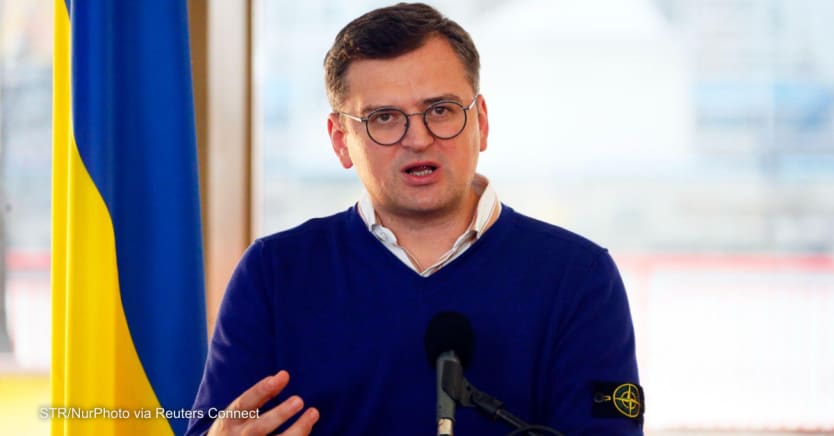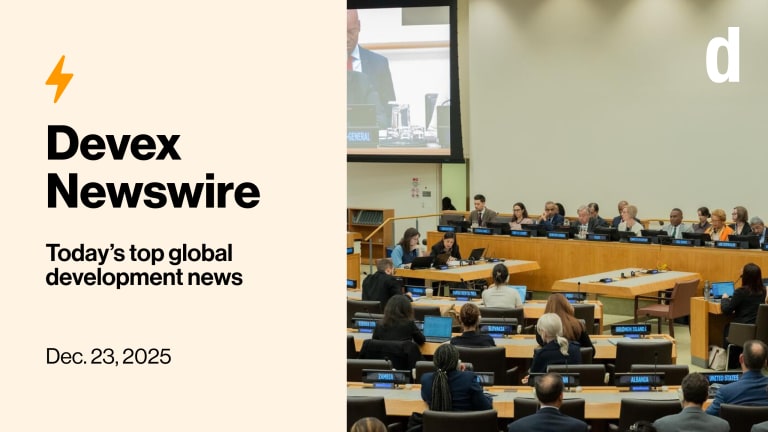
Ukraine’s foreign minister will soon conduct an “extensive” tour of sub-Saharan Africa, a Ukrainian official said Monday, adding that Ukraine and African countries have a common cause in trying to “define their own destiny.”
Serhiy Tereshko, deputy head of the mission of Ukraine to the European Union, said that Foreign Minister Dmytro Kuleba would travel “in coming weeks, I believe, or days.”
Speaking at a panel discussion on Baltic-Africa relations in Brussels, Tereshko declined to say when or where exactly Kuleba would travel but said that the trip would likely include countries that Ukrainian top officials had never visited before.
“The accent will be on sub-Saharan, central Africa,” Tereshko said. “The idea [is] to have the visits to the places where we do not have diplomatic presence and to establish ties.”
Russia’s full-scale invasion of Ukraine on Feb. 24 has sparked a battle of narratives over who is to blame for rising food prices, which are hitting low-income countries especially hard. Russia continues to blame Western sanctions, while European leaders say Russian President Vladimir Putin is using hunger as a weapon, targeting Ukraine’s agricultural infrastructure, and hindering access to Black Sea ports.
In July, ambassadors from EU countries in Addis Ababa, the capital of the African Union, wrote a candid, confidential report, obtained by Devex, in which they noted that many African states “do not identify an interest in taking sides in what they perceive as an ‘East-West’ conflict” in Ukraine.
“The colonial and post-colonial legacies, including historical ties of a good range of countries with the Soviet Union and subsequently Russia, strongly influence mindsets and positions, as do perceived Western double standards,” the report stated. “Furthermore, [African Union member states] are concerned about Russian pressure on them.”
And on sanctions, the ambassadors noted that “It is not enough to say that ‘EU sanctions are not responsible for the food crisis’, we need more substance and sharper LTTs [lines to take], including from EU Headquarters.”
The Wall Street Journal reported that the European Commission issued revised guidance to EU member states last week, making it clear that fertilizers, coal, and other products from Russia can be sent to the rest of the world via the EU.
Macky Sall, the president of Senegal and current chairman of the African Union, told the 77th United Nations General Assembly last week that “Africa has suffered enough of the burden of history.”
“[Africa] does not want to be the breeding ground of a new Cold War, but rather a pole of stability and opportunity open to all its partners, on a mutually beneficial basis,” Sall said.
Kuleba’s trip this fall was announced in early August by Ukrainian President Volodymyr Zelenskyy who said that African countries and Ukraine had not been sufficiently close in the past. Since Russia’s full-scale invasion this year, however, Zelenskyy said he had had phone conversations with many African leaders and that Ukraine wanted to do more to guarantee food security, pursue cultural exchanges, and share its expertise in digital services in Africa.
Tereshko said Monday that Ukraine is “standing for the things which African countries are standing for: for their sovereign choices, for their right to define their own destiny,” and he said that Ukraine and African countries should better coordinate their efforts in foreign affairs.
In March this year, 17 African countries abstained from a U.N. General Assembly vote, condemning Russia’s invasion of Ukraine.
“It’s a sad irony that African countries, in a big majority, are shy to follow [the] Western approach on the U.N. stage,” Tereshko said. While Ukraine and Africa pushing for reform of the UN Security Council, Tereshko said that “Russia is willing to preserve the status quo, which satisfies neither Ukraine nor Africa.”
Tereshko argued that the EU’s African policy had been led mostly by western Europe, but that Ukraine could bring “fresh air” to relations between the two continents.
Despite the war, he noted that Ukraine had provided grain to Somalia and Ethiopia as humanitarian assistance, calling for greater communication efforts to make such support “felt and known on the ground.”








